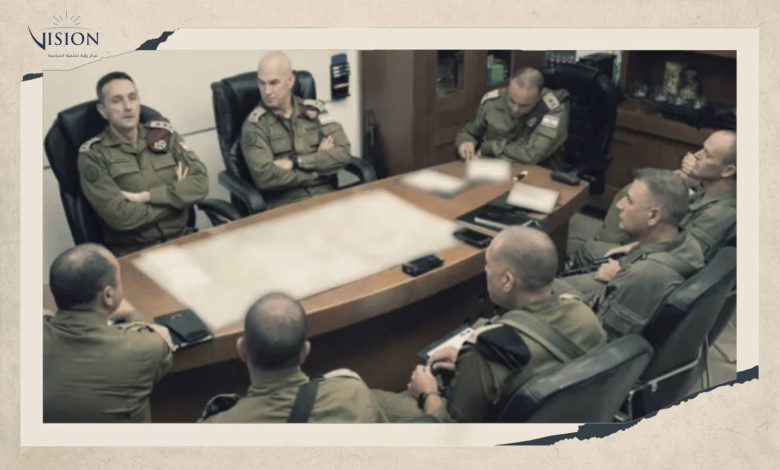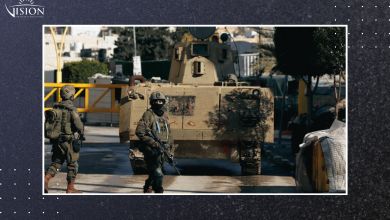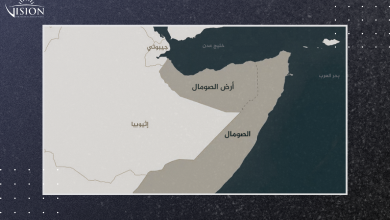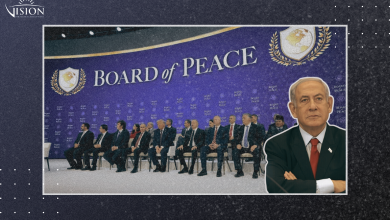Palestinian Options in Response to the Generals’ Plan in Northern Gaza

In early October 2024, the Israeli military formally announced a focused military operation in Northern Gaza, marking the fourth such intervention in this region. This came alongside the disclosure of a strategic plan, drafted by high-ranking Israeli generals, aiming to secure control over Northern Gaza—a plan subsequently approved by Israeli Prime Minister Benjamin Netanyahu.
The generals’ proposal centers on forcibly displacing the inhabitants of Northern Gaza through a full-scale siege that cuts off humanitarian aid, essentially forcing resistance groups into a dilemma: surrender or face death.
To implement this, the Israeli military has engaged in deliberate acts of destruction and violence, resulting in over 1,800 Palestinian deaths and the near-total incapacitation of essential services, including shelters, hospitals, and healthcare facilities.
Amid these developments, the Vision Center for Political Development, in cooperation with Al Jazeera Net, conducted a survey of insights from experts and academics. This endeavor sought to evaluate the potential outcomes of the generals’ plan, assess the feasibility of its implementation by Israeli occupation, and identify Palestinian strategies to counter it.
The insights were organized around several pressing questions:
- What are the potential outcomes of Israel’s generals’ plan in Northern Gaza?
- Should Israel succeed in implementing this plan, would it be able to secure cooperation from any Gaza-based Palestinian entities willing to negotiate under a new administrative framework?
- What actions are necessary from Palestinian, Arab, and regional actors to thwart the imposition of this plan?
- What implications do current regional dynamics hold for Gaza’s future?
- What are the prospects for recent American diplomatic efforts aimed at encouraging Israel to leverage the outcomes of the war, shift towards a ceasefire, and embrace a diplomatic path?
Summary of Expert Opinions
- The Generals’ Plan represents a concentrated synthesis of Israel’s overarching military strategies in Gaza since the beginning of the conflict, strategies which Israel has consistently denied executing.
- The plan can be understood on multiple levels: ideologically, as a reinforcement of specific foundational beliefs; pragmatically, as an alternative to the complete expulsion of Gaza’s population; and strategically, as an urgent security measure from Israel’s perspective.
- Politically, the implementation of this plan is significant for Israel as it aims to achieve measurable outcomes that can be presented to the Israeli public as concrete achievements.
- Israel may succeed in the initial phase, which involves the forced displacement of a considerable portion of the northern Gaza population through military coercion. However, the feasibility of fully executing the plan remains contingent on the evolving dynamics on the ground.
- Even if Israel succeeds in its current military operations, it is unlikely that it would immediately initiate settlement construction in Gaza. Such steps would likely be postponed until the cessation of hostilities and a thorough assessment of the conflict’s outcomes.
- Acknowledging the difficulty of securing a Palestinian partner willing to operate within the proposed administrative framework, Israel has started exploring partnerships with American corporations and other international actors to fulfill this role.
- The core issue is not solely Israel’s potential imposition of an administrative model in Gaza but also the absence of a cohesive Palestinian vision to effectively counter Israeli policies.
- Palestinians now face an urgent need to establish a parallel administrative structure, reminiscent of past resistance strategies during the first and second intifadas, to address the governance void created by the occupation.
- Palestinian leadership requires a flexible and adaptive political vision that responds to current challenges. Therefore, dependence solely on internal reconciliation or a single governing entity is insufficient; preserving the political identity of the Palestinian entity is paramount.
- The Palestinian Authority must mobilize Arab and international support to bolster its administrative role in Gaza, as Israel persists in advancing its plans under the pretext of dismantling Hamas governance.
- Gaza’s future is deeply intertwined with several potential shifts, including the possibility of a major regional conflict, the position of the new U.S. administration, progress in Palestinian reconciliation, or the end of Hamas’s rule.
- The United States’ current approach centers on a strategic reconfiguration of the regional landscape to reassert Israel’s central role, providing it with the necessary time and space to pursue these long-term objectives.
The complete analysis can be found in Arabic by clicking below:
https://www.aljazeera.net/politics/2024/11/13/هل-تجد-خطة-نتنياهو-بضم-الضفة-آذانا





